#the music the story the characters their sacrifices
Explore tagged Tumblr posts
Text
I received a long ask in Russian, a breakdown of the episode and the idea that Nick is actually alive.
From what I understand, the theory is that June is telling the story through her book, and she deliberately hid the fact that she saved Nick, to protect him and run away with him. That’s why no one knows he’s alive.
I translated the theory with an AI, so don’t judge too harshly if something’s a bit off 😅
First the theory.
Then my opinion.
__________________________________________
Episode 10 Breakdown. Nick is alive :)
4:40 – Flashback with Nick, and he doesn’t board the plane.
7:00 – Conversation with Luke: Hannah is in Colorado. In Season 2, when June was burning letters in the kitchen and Nick grabbed them – we saw the word “Colorado” burning.
Let’s take the full chain of events with the letters:
Because of the forced help, June gets Omar hanged / Lydia drags her to the wall / she has a breakdown / burns the letters, Nick grabs them – again fire symbolism / Nick is forced to marry Eden / June is dying in the bushes / Nick saves her – this mirrors Nick’s own arc: info leak causes Jezebels’ deaths / he has a breakdown / his wife asks him to accept Gilead (i.e. they force him to “marry” the regime) / he nearly boards a plane to die / June saves him.
The letters are the center of this mirror.
The “mirror” song was sung by the girls at the bar, and June sang it too – to both Hannah and Nicole.
5:30 – June walking, voiceover. Boston commanders are dead. “God always needs sacrifices.” Only Lawrence’s silhouette remains.
9:40 – Conversation with Mark. “My son lives in Hawaii with my ex-wife. The best I can do is to break Gilead so he won’t have to live in it.”
• Hello Hawaii – mirror to Nick: his ex-wife and son are in Gilead. He walked away to do the best for his son.
• Watch June’s reactions and Mark’s nod. “Then we’ll rest.”
14:00 – Conversation with Serena. She offers condolences about Nick’s death.
June replies: “Nick reaped what he sowed. He led a life full of violence and lies.”
Serena: “If he had a choice – he would’ve chosen you.”
Their music plays, and June smiles to herself. Serena looks confused, glancing twice at June’s reaction.
June chose him. That’s the core of this season – and the entire show.
By the way, in Season 1 the word “choice” was repeated a lot.
Nick told June she didn’t have a choice whether or not to tell the Mexican delegation if she was happy. Later, when Nick tried to end their relationship for safety, June told him she had no choice.
In Season 1, they clearly chose each other.
From the end of 4 through 6.03, we see endless oscillation between their respective partners.
This is the core choice the characters must make, no matter what the writers say.
In 6.03, Nick says only she matters. Now it’s June’s turn.
In 6.06, she wavers and almost agrees.
Then comes the betrayal arc, and everything falls apart like a house of cards.
If she saved him on the trap (where they almost kissed), then that’s her choosing Nick.
Other choices (Gilead resistance, Hannah) were never in question.
19:00 – Conversation with Mark. He gives June a pass to enter her old district and says his title – Commander.
Watch June’s reaction: glowing, sighing, literally skipping away.
21:00 – Walk with Emily. It’s all about life with Nick and leaving one’s family.
Emily talks about her life as a Martha with a Commander friend and accepting her life away from her family – still loving and talking to them.
At the wall: “My understanding of the impossible has changed.” – Watch June’s reaction.
24:00 – Karaoke scene with the girls.
Lyrics: Heavenly mirror, tell me what love is. It brought me back. Can I survive the changes in life? Time makes us braver.
25:20 – In BG, June finds a red Handmaid’s dress and burns it.
She used to come to Nick as a Handmaid – even to the Magdalene, she wore a red coat.
Even her marriage with Luke might symbolize being a “proper wife.”
The song continues: I always feared change. I built my life around you. But time makes us braver. Children grow up…
41:00 – Goodbye with Luke.
“I underestimated you, I’m sorry.” Finally!
He says where he’s going, pauses – waiting for June to join.
She says she’s going the other way with Mark.
“Okay, we’ll meet at Hannah’s.”
Nick loved you and you loved him – June smiles blissfully. Not a grief smile.
She looks up to the sky – flashback to their family. Like a farewell.
47:30 – She walks to the Waterford house wearing a blue-green coat – a wife’s coat!
She’s going to Nick as his wife!
Remember their date in Magdalene with Nicole? Bingo!
She walks to the garage – and looks up at the window.
Same as in Magdalene.
She stops. Pauses – looks at the window. Ahhh.
Their theme plays – June/Nick music.
It’s clear now that it’s june who’s writing the book and in it, she’s describing her life and Nick’s death.
———————————————————————
And now, what I think about all of this.
No, I don’t believe that’s what actually happened. Even though this theory breaks down all the breadcrumbs and bones they threw at the osblaine fans really well. The symbolism, the parallels, the dialogues, the fucking music - all about them. Like they gave us our bones and expected us to choke on them.
Why don’t I believe the theory? Because I’ve been a shipper for a long time, and I’ve been in this place of denial before. Way back, I used to ship Beth and Daryl from The Walking Dead. If you watched it, you’ll know — they were this super compelling duo from completely different worlds, with amazing chemistry. She had a powerful influence on him and vice versa. There was a big age gap, and for a while the writers were clearly teasing something romantic between them. Lots of buildup, tons of hints.
And then? They chickened out or something else happened. Long story short, they killed off Beth. And no one could accept it. Like, really couldn’t. I swear to God, the internet exploded with theories about how it’s possible to survive a headshot. There were even “medical proofs” being cited that someone could survive it, and that Beth did. I don’t remember all the details now maybe someone else here does but I absolutely went through a phase where I believed she was alive. Because I was grieving so hard, and my brain just wouldn’t let me accept the truth. I wanted that ship too much.
I don’t think that’s what’s going on with Nick. Mostly because of how hard they’ve been trashing him in interviews. Like, how many times have they outright confirmed he’s dead? So no, I don’t buy it.
BUT — and this is important, let’s put it in bold or caps:
KEEP TALKING ABOUT THIS THEORY.
Because if the showrunners, the network, the producers, if they’re freaking out over the mess they’ve made and have no idea how to regain control, then THIS is a very real way to fix it:
Bring. Nick. Back.
We haven’t seen the body, right? And if there’s no body, then he’s not dead. You can always bring someone back. I mean, Dexter was literally shot in the chest at close range with a rifle, and this summer we’re getting a new season where he’s alive and escapes the hospital. After being exposed as a serial killer. If they can find a way to do that, they can find a way to bring Nick back.
So yeah. Take Max. Throw all the money in the world at him. Make it happen. I don’t give a fuck how you do it 😂
Fans just gave you a perfect excuse to make it work. You can absolutely stretch the logic, just wrap that owl around the globe and call it canon, right ?????
62 notes
·
View notes
Text
Collectivity and individuality in the ensemble of Les Misérables
Last year I wrote my bachelor's thesis about ensembles in musicals and in Les Mis in particular, so I thought it would be fun to post something about the conclusion of my research for this year's barricade day. I am currently writing another thesis (also related to Les Mis lmao), so I did not have the time to reformat it or anything, but I think my original conclusion of the case study + part of the conclusion of the thesis together make my point pretty well either way. I hope y'all find it as interesting to read as I found to research it!
The ensemble in Les Misérables constantly shifts between being seen as one, unified group and as a collection of individuals. As a group, they embody the collective voice of the miserable people of France, in the form of beggars and workers. They shift between groups as well, which are distinguishable by costumes and music. As a group, the ensemble is a lens for the audience to watch the action through. In this way, they are in charge of the focus and the pace of the narrative. They can isolate or embrace characters from their community, and they can grant authority to people. In contrast to their functioning as a group, the ensemble can also be seen as individuals. From the way that they have been written into the story, some ensemble characters have more space to express their individuality, while other parts are less set, giving more freedom to the performers to make their own characterisation. This freedom of interpretation is not guaranteed for big, corporate musicals. Other musicals are more strict in the way new actors perform the same roles. Within Les Misérables, individualisation comes from both the space that is made in the script and the freedom that actors get to interpret their own roles. Performers can take inspiration from Hugo’s novel too, which has the added benefit of certain audience members recognising the characters on stage, making it easier for them to be seen as individuals. This is less applicable for the women of the ensemble, as their parts generally do not have a counterpart in the book, which does give them more freedom over their own characterisation. While there is a lot of space for individualisation in the show, there is also a feeling of community among the cast. This is helped by most principal cast members having ensemble parts, making the performers feel that they are telling a story together, as one group.
Les Misérables has themes that relate to love, faith and sacrifice in particular, although the ensemble is mostly related to another theme, namely that of social injustice. This theme is prevalent throughout the narrative and affects all characters in one way or another, but it is the ensemble that really embodies it. They are themselves “the miserables.” They are both the people who fight against social injustice, in the form of the students, and the people who they are fighting for, as the poor, the convicts, the factory workers, and so on. While the principal characters represent the individual stories of people undergoing these hardships, the ensemble makes it clear that these are not isolated stories, only the stories that this particular narrative is focussing on. Having the ensemble be both a collective of miserable people, and having them be individuals in their own right, shows that there are numerous people who suffer under the same system and that they are worth fighting for. These are the people who Enjolras wanted to see rise, but also the people who did not join him in the end. While it is disappointing in the moment that the people do not rise, the audience has seen how difficult the actual individual people’s lives are. In “At the End of the Day” the factory workers have already made clear that “the children have got to be fed.” Still, the students show the audience that there are people who will fight for a better tomorrow, for all these faceless people who are actually not that faceless anymore. At the same time, it is a call to action for the audience, to “join in the fight that will give you the right to be free.” That is what gives the audience hope, and that is what makes Les Misérables such a powerful story. It shows that there are people who need someone to fight for them and it shows that there are people who will, and it is the ensemble that embodies both of these people on the stage.
...
A full performance analysis of Les Misérables needs to take into account the context of the show, the performers’ materiality, and the background of the audience member watching it. By focusing on the juxtaposition of the collective and the individual, it appears that the ensemble performers in this show differ in the amount of space and freedom they have for individualising their characters, while they are always a part of the collective group of “the miserables.” Every character in Les Misérables suffers under social injustice, most especially a lot of the ensemble parts, which makes this an important theme in the show. Through its narrative and through its ensemble performance, it shows that there are people who are worth fighting for, and people who are willing to fight for them. By presenting these people as individual characters through sung solos, costuming and silent acting – among other things – they are humanised and are no longer a faceless entity of miserable people. This makes the audience empathise with them, and possibly relate their own experiences to these characters.
Relating this to Millie Taylor’s theory of the ensemble musical as a depiction of a utopian future, Les Misérables becomes an embodied display of the realities of contemporary society. One might say that this is not possible, as it is situated in 19th century France, but the struggles that people face in Les Misérables because of social injustices are still true nowadays. Victor Hugo himself prefaced his original novel by saying that similar books will be needed, as long as there is still misery on earth. The musical is a reminder of that. Its popularity comes from its necessity in showing people that there is injustice in the world, while simultaneously giving them hope for a better tomorrow. The ensemble plays an important role in this message. If not for them, the world of Les Misérables would be barren and the collective people would not have a representative on the stage, which would, in turn, weaken the power of the show’s message. The ensemble is needed to give the ordinary people a face, separate from the extraordinary principal characters.
In conclusion, the ensemble of Les Misérables contributes to the meaning of the musical by embodying both the miserable people of its title as a collective entity, and as individual people. This bolsters the show’s message that social injustice has to be fought. Hence, the ensemble is indispensable. Through individualising minor characters, it becomes apparent that all those who suffer have their own stories and are worth saving. The story then becomes an analogy for real world suffering. Ultimately, the hope is that the audience will take this message to heart and rise to fight injustice, in the way that the people of Paris did not do in 1832.
#les mis#les miserables#barricade day#barricade day 2025#les mis meta#I hope this all makes sense lmao#I just see a lot of cool meta in the fandom and I thought I would contribute for once :)#so I hope people like it#or find it interesting at least#I also wrote a lot more about the semiotics of ensembles in musicals in general#and for the case study itself I wrote a lot about specific ensemble moments and stuff#such as about Grantaire's role and the other featured ensemble#and I used Courfeyrac's characterisation as an example for how the novel influences the musical at one point#so if anyone is interested in any of that hit me up lol#I always love to talk about Les Mis and ensembles :)#alright that's it for me#happy barricade day y'all <3
22 notes
·
View notes
Text
help I'm thinking too hard about outer wilds again
#outer wilds#I could talk about this game forever#I could THINK about this game forever#the music the story the characters their sacrifices#the leitmotifs#the nomai and the strangers being mirrors#can't wait to get that physical switch copy
8 notes
·
View notes
Text
My biggest issue in Epic the Musical is Odysseus, actually. In this essay, I will....
#good god I hate his (lack of) character arc#if you want me to believe he is a monster then he gotta be consistently!!!! monstrous!!!#but no he is constantly allowed to be a poor pissbaby because portraying him as anything *gasp* morally dubious is bad#idk i don't know anything about the og myths but to me Epic's Odysseus bounces around between moods far too fast but he is always allowed t#reset back into what he has been from the start#none of his angst feels earned at any point because basically all the “bad choices” he's been put into have been outside of his control#except maiming the sirens and sacrificing people to scylla#which feel so out of character at that point to me because the next song he's whining to Zeus to not make him choose between him and his me#bitch if you were willing to sacrifice them two seconds ago why not now#why not have odysseus be the one to suggest sacrificing his men instead of him to show how far he is actually willing to go#but noooo his hand needs to be forced because???#at that point in the musical I feel like he should've been far more cruel so the Ithaca saga will actually feel like something#gives this man some agency to be a fucked up guy by himself. please.#it would've made the poseidon fight even more satisfying. he's capable because he has grown so cold. but no#idk maybe I'm missing the point but ugh#I saw a great comment unrelated to this that was like#“if you aren't comfortable with dark implications in your stories then don't write dark stories”#which I feel like applies here so well#epic the musical critical
37 notes
·
View notes
Text
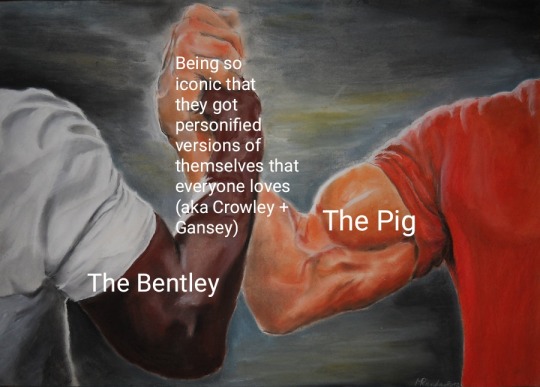
#they're the best characters your honour#i feel so many ways about gansey and the pig#like you could say gansey (narratively speaking) serves as the vehicle for the story; despite the fact that he was supposed to die#and even tho the pig keeps breaking down gansey keeps forcing it to power through#just like how he forces himself to keep going even as his time is running out#i don't remember if this actually happens but the pig eventually runs on magic instead of its engine#which is a parallel to gansey being kept alive with magic (noah and cabeswater's sacrifice)#and as for crowley; I think the bentley embodies everything that he's trying to supress#we see this more clearly when aziraphale is driving it and it willingly lets him change its colour; the music; and the speed#i always found it interesting that whilst crowley keeps trying to convince aziraphale he's not the way he is bc he's a demon#he also uses his demonic aesthetics as something to hide behind; just like how his sunglasses act as a wall between him and everyone else#he lets aziraphale assume he's used a gun before and he leans into the whole “demons lie” rhetoric#and yet the bentley is the most honest version of him we get to see bc it exists without restrictions (aside from the ones crowley imposes)#anyways it's probably not that deep lol#gansey#crowley#good omens#trc#the bentley#the pig
12 notes
·
View notes
Text
just read one of the worst nosferatu takes on here and i’m sorry but i have to post about it
like probably one of the worst movie takes i’ve ever read honestly. “hm maybe they should’ve treated women better and not made the villain a ‘hook nosed invader’” type thing. we finally found them, the most performative tumblr user.
(don’t rb this lol)
#like. they based his look off of portraits of vlad the impaler.#a lot of the nobility of the time had hooked noses. and he wasn’t the only character who had one. what the fuck are you on about.#also like. that is how women were treated in the 1830s. and also people with mental afflictions. they tied them up sometimes.#the fact that someone believed her in the end and allowed her to do what she needed to do was more grace than most women were allowed#also#to complain about offensive romani stereotypes??#they casted romani people to play music and dance in that scene as accurately as possible#and the bit about virginal sacrifice? yeah. people did that. they went out to the woods & staked corpses in the ground bc they were scared#that’s not a stereotype and they were not the only peoples that did that#that’s what terrified people who did not know better did. and despite that#the people in the movie DID know. they did know that there was a vampire around. and they did know what they needed to do.#warn the white man who won’t listen. he’ll go anyway and call us peasants and then probably die bc he doesn’t listen#that’s a stereotype ig but it’s happened often enough irl to warrant being put into the story#white people don’t listen to those who know better 🤷♀️#i’m not even gonna tag this for the movie bc i don’t wanna confrontation#i didn’t comment on their post bc i don’t wanna make conflict#but i’m in disbelief that THAT is what is stopping u from enjoying a great movie#it was the 1830s in europe#women weren’t treated very well!!!! big fucking surprise!!!!!!!!!
0 notes
Text
💗 Rafayel – Five Years Later

The second in a series of stories exploring MC’s return after five years of silence. Others are coming soon — links will be added as they’re published.
Original ask that sparked this continuation.
Sylus | Caleb | Zayne | Xavier (coming soon)

CW/TW: Trauma & PTSD themes, Implied past abduction, Betrayal / emotional manipulation, Poisoning & near-death experience, Violence (including one execution-style kill), Self-sacrifice, Intense emotional conflict, References to grief, guilt, and long-term separation, Complex relationship dynamics, Themes of forgiveness and healing While inspired by the original characters and lore of the game, this is a personal interpretation. Some aspects of character behavior, relationships, or world-building may differ from canon — especially given the five-year time gap and the impact of traumatic events. Consider it an alternate emotional timeline, shaped by growth, grief, and what-ifs.

(He taught himself silence. Learned to paint with absence, to breathe through longing. But when your shadow crossed his path again — living, breaking, real — the stillness inside him remembered how to shatter.)
The thing about disappearing is — if you do it right — no one comes looking.
Not because they don’t care. But because you made it easier to pretend you were never real in the first place.
You left the sea behind. The salt. The songs. The man with sunlight in his laugh and grief in his hands. You traded it all for concrete, steel, smoke. Somewhere between New Madrid and the Eleventh Sector, you stopped being a person and became a profile: Level 3, Tactical Division, Close Range Neutralization. Specializing in high-value body retention.
A shadow with a badge. A ghost on retainer.
It suited you.
You didn’t drink anymore. You didn’t play games. You didn’t say his name.
“Client arrival is in twenty minutes,” crackles the comm in your ear. "Full week assignment. High confidentiality. Zero contact protocol unless engaged."
You glance at your reflection in the elevator’s gold trim.
Eyes colder. Shoulders straighter. Gun holstered under a matte jacket that still smells faintly of last week’s adrenaline. You're not the girl who once cried into coral bedsheets. You're her replacement.
The hotel smells like money. That antiseptic richness meant to distract from the emptiness.
You position yourself in the lobby near the marble fountain — half concealed, half obvious. Just enough to look like part of the architecture. Just enough to see everything.
The concierge nods. The manager paces. The staff adjust flowers no one will notice.
Then: the cars. Black, sleek, ghost-silent.
Doors open.
Two assistants spill out first. Press, probably. One on a tablet, one on comms. Then a manager — with a face oddly familiar, like a half-forgotten memory trying to surface. Then—
Your heart forgets how to be a muscle.
He steps out like the city belongs to him. Like time bent itself around his absence.
Still tall. Still too elegant for the world he’s forced to live in. Purple waves of hair tied back. Sunglasses sliding down a nose built for poetry. He’s wearing that long beige coat he used to throw over your shoulders when nights got too cold, and his cologne hits you like déjà vu dipped in seawater and regret.
Your mouth is dry. Your hands are ice.
He doesn’t look at you.
Not yet.
You do what you were trained to do: you check for threats. Scan exits. Ignore your pulse.
He walks through the lobby as if unaware. As if untouched. But when he passes, just before the elevator closes — he turns his head.
And smiles.
Like sin. Like summer. Like he knew it would be you.
Then—
“Hello again, Ms. Bodyguard.”
***
The suite was silent. Too silent for something this expensive.
No music. No hum of ventilation. Just the hush of carpet under your boots, and the faint, distant rhythm of city breath outside the window.
You stood near the corner, hands behind your back, spine too straight. Default position. Default you.
He was across the room, jacket already off, sleeves rolled. Moving like someone who was used to being observed. Not by the public — by ghosts.
The wine had already been poured. He handed you a glass like it was part of the ritual. You didn’t take it.
He arched an eyebrow.
“I’m working,” you said.
He didn’t insist. Just smiled, faintly.
Of course.
He used to fill every room — all noise and color and heat. But now, somehow, he'd grown quiet. Not in absence — in weight. Like a masterpiece in a gallery. Like the only rose in a field of thorns. You could look away, but you’d still feel him. Like a crosshair you couldn’t shake.
The window beside you looked out over the city — not that you were looking. Your eyes were trained on his reflection in the glass. Even blurred by distance and light, you could tell: he hadn’t broken. But he’d bent.
Harder than most things could survive.
His voice came low, like something remembered instead of spoken.
“You weren’t always stone.”
You didn’t answer.
He crossed the room without hurry. You didn’t move.
His eyes found yours — not searching, just… waiting. Like the question wasn’t whether you’d speak. It was whether you still could.
“And yet here you are,” he murmured, “standing in my suite like you were carved to fit the corner.”
You felt the words land somewhere deep in the ribs. You didn’t flinch. Didn’t speak.
He took a slow sip from his glass. The color of the wine caught in the light — the same shade he used to mix on his palette when painting you in shadow.
“I saw the new series,” you said, voice even.
He glanced at you over the rim.
“Did you?”
“Less gold. More... grief.”
A pause. Then a smile — dry, almost kind.
“I ran out of yellow.”
That made your throat tighten. You looked away before it showed.
He studied you. Not your face — your posture. Your silences. You weren’t hiding emotion. You were holding it.
Like a soldier holding a wound closed with one hand.
“And you,” he said, softly. “Still chasing bullets?”
“I don’t chase. I shield.”
“Of course you do.”
He stepped closer. Not enough to touch. But enough that you could feel him again. That impossible warmth, wrapped in restraint.
He looked at you like an old painting. The kind you see once, remember forever, and never find again.
“You followed me,” he said, almost offhand. “Even after you left.”
You didn’t deny it.
“I had to know you were… functioning.”
He laughed — quiet, empty.
“Functioning,” he repeated. “Right.”
You searched his face for anger. You didn’t find it. Only something slower. Older.
Like ash.
“How have you been?” you asked.
It was a mistake. The question hung in the air like smoke from a match — small, stupid, but dangerous.
He stared at you for a long moment.
Then the glass in his hand cracked. A clean, bright sound. Like winter splitting.
The wine didn’t spill. He didn’t move.
“You left,” he said.
Not bitter. Not accusing.
Just: you left.
“And now you want to ask if I’ve been well?”
You shifted. Just enough to register discomfort. Nothing more.
He looked at the flame creeping along his knuckles — Evol, awake and restless. He closed his fist, and the fire vanished like breath from a mirror.
“What did I do?” he asked, quieter now. “What sin did I commit to earn a silent goodbye?”
You drew breath through your nose. Measured.
“I was tired.”
“Of what?”
You looked at him.
“Of being a story you told instead of a person you knew.”
That did it.
Not an explosion. Not a slam. Just a shift. Like something in his chest cracked, and he had no hands free to hold it in place.
He turned. Slowly. Set the broken glass down. No sound. No shatter.
Then he walked to the adjoining door, pressed it open.
“You’ll stay here,” he said.
A simple guest room. Clean, unpersonalized. Quiet.
He didn’t look at you when he added:
“You’re my shadow for the week. No leaving. No exceptions.”
“And if I object?”
He paused at the threshold. Then turned. Finally met your eyes again.
“You won’t,” he said.
Not a command. Just a prophecy.
***
The days blurred.
They stretched long — drawn out by tension and silence — and yet they flew past with the quiet cruelty of something you couldn’t stop. You caught yourself counting minutes. Not until the assignment ended — but until he left again.
You told yourself it was duty. But no. You knew. The closer it got, the more it scared you.
You’d thought you’d buried the past. That five years had been enough to cauterize what you felt. Enough to flatten grief into dull, predictable weight. You’d taught yourself not to cry. Not to ache. Not to wake up reaching for a voice that wasn’t there.
But now—
Now the thought of losing him again bled through you like poison Slow. Sharp. Relentless.
For the first time, you truly wondered — had you made the worst mistake of your life?
You’d always known leaving was cowardice. A reaction. A wound reacting to pressure. You’d told yourself it was necessary — that you couldn’t survive another secret, another lie, another impossible moment in his orbit.
But now, as you stood in his shadow again, you returned to the one truth you kept avoiding. It wasn’t just the secrets. It wasn’t just his careful, curated nonchalance. It wasn’t even the things he didn’t say.
It was that moment — the one you could never forget.
The Nest. The kidnapping. The deal he’d made behind your back.
The betrayal.
The man who once made you feel like a myth had handed you over like a pawn. And you’d left. Because you couldn’t find a version of yourself that could love him and survive it.
But now…
Now you knew. The price you both paid for your fear had been too high.
***
He treated you like a shadow. Professional. Polite. Silent.
He didn’t try to speak. Didn’t joke. Didn’t prod. Whatever playful gleam had once lived in him now belonged to the stage.
You watched him wear charm like a costume — perfectly tailored, easily removed.
The real man?
He wore quieter things now. No more garish brands. No flash. Just silk-lined precision. Weight without noise. Like he’d stopped needing to be seen in order to feel powerful.
And yet — you felt it. The way his gaze burned across rooms. The way silence wrapped around you both like a loaded pause.
Something was coming. You didn’t know what.
Only that it would not be small.
***
Then came the reception.
A charity event. Wealth, power, and politics pretending to like each other in the same room. He handed you your role the night before — not as a request.
You weren’t the bodyguard tonight. You were his date.
No one must suspect otherwise. His reputation demanded it.
And so here you were:
Draped in sea-glass velvet, cut to glide and cling. Your hair swept into soft, impossible waves. Sapphires at your ears, your throat. Everything felt too heavy. Too expensive. Even your heels were a weapon you didn’t know how to use. You hated how they made you move — slow, deliberate. Exposed.
The car slid to a stop. He stepped out first — a vision in black and steel. Then he turned, offered you a hand.
You took it. His skin was cold.
But the touch — the touch burned. Like nothing had ever healed.
Cameras. Screams. Flashing lights.
Your instincts screamed — scan the crowd. Find the threat. Always the threat. But his fingers tightened around yours. Hard.
He leaned in, breath against your ear — warm, familiar, furious.
“Smile, for fuck’s sake.”
You did.
Not for the cameras. Not for the cause.
But because you knew — the storm wasn’t over. It was just beginning.
***
You played the part well.
Neutral. Polished. Cold enough to earn whispers you never heard, but felt just behind your back.
No one dared speak them aloud, of course. They looked at you and said the compliments to him.
“She’s stunning.”
“Such a refined presence.”
“As if she was made to be on your arm.”
As if your face belonged to him. As if your silence was his design.
In some twisted way, maybe it was.
You didn’t remember how you got here. One minute you were cataloguing exits with your eyes, tracking the crowd with practiced ease —
The next —
You were dancing.
His hand on your waist, the other guiding yours. Everything too close, too warm, too practiced.
The chandelier above cast a slow rain of light. The room turned gently, spinning around its own silence.
His touch wasn’t tender. It was intentional.
“Your expression,” he murmured, “is slowly assassinating my reputation.”
You didn’t look at him. “Your reputation as what, exactly?”
He paused. Just a second.Then:
“A man of appetites.”
You tilted your head slightly. “How poetic.”
“I thought so,” he said. “Though the press prefers playboy.”
A beat.
“So you’ve read it,” you said.
“I have someone who clips the good parts.”
“Must be a short list.”
He smiled — not kindly. “Normally, I’m seen with far more… expressive company.”
“Then why break tradition?”
His fingers flexed slightly at your waist.
“I suppose I wanted something quieter.” A beat. “Something that might bite back.”
Your gaze flicked to him. Just once. A sharpened glance.
“And how does this help your image?”
“It doesn’t.” He leaned in, voice a thread. “But it’s not always about image, is it?”
You could feel it — the heat building between syllables. Not passion. Not yet.
Just tension. Waiting.
You moved together like two creatures pretending not to hunt each other. Each step precise. Each breath withheld.
“You used to enjoy this sort of thing,” he said, voice soft now, too close. “Crowds. Light. Being seen.”
“I used to believe in things,” you replied.
He said nothing. But his hand curled tighter against your spine.
For a second, you let the silence say everything.
Then—
You noticed it.
The way his eyes had started slipping away from you. Again and again — to a single shape on the edge of the room. A man. Grey suit. Clean line. Controlled posture.
You knew that look.
The dance ended, but you weren’t let go. He took your arm, like a gentleman.
But you knew better.
***
The garden was colder than it had any right to be. The kind of cold that wasn’t about temperature — it was about distance. About the way stone walls and sculpted hedges swallowed sound and left only the weight of footsteps behind.
You followed him without a word. Because you already knew.
You’d seen his eyes stray to the man in the grey suit half a dozen times during the reception. Not nervous glances — calculated ones. Not curiosity — confirmation.
And now here you were, walking straight into the web.
The man waited by the marble fountain, one hand resting casually in his pocket, the other holding a glass of something expensive and unnecessary. His smile was pleasant. His suit was quiet money. His name was carved into memory from the briefings you used to skim with more detachment.
Elias Varrick. Publicly: philanthropist, investor, art collector, father of four. Privately: suspected ties to high-level biotech experimentation, classified marine acquisitions, and several quiet disappearances.
All rumors, of course. Nothing on paper. Nothing proven.
Still — you knew. Your gut always knew.
But you didn’t know what Rafayel knew. Not yet.
They greeted each other like old acquaintances. A handshake that looked effortless. Painless.
“I thought it best to deliver the piece myself,” Rafayel said. His voice had its old rhythm — slow, warm, dipped in charm.
You watched him as he spoke. Not the words — the tone.
Polite. Polished. Performing.
“That kind of personal art,” he added, “deserves a personal hand.”
Varrick smiled wider. “Very kind of you. My family will love it. We’re planning to hang it in the main lounge — the one where we gather in the evenings. My wife, the children, my mother. It’s where we live.”
And that’s when it happened.
You didn’t freeze. Not outwardly. But something inside you did.
That phrase. The way he said it — we live here.
You didn’t hear a lie. That was the problem. You heard sincerity.
You saw the portrait — Rafayel’s portrait — hanging above a mantel. You saw children playing on a rug beneath it. An old woman sipping tea in a chair nearby. You saw innocence. Unaware. Wrapped around a weapon.
And suddenly, all the scattered images connected. The rumors. The names. The “environmental” fund. The experimental projects tied to Lemurians. The disappearances.
He wasn’t here for charity.
Rafayel was hunting. And you were holding his arm like a lover while he did it.
It wasn’t the lie that made you pull away. It was the memory of all the ones that came before.
You stepped back. A breath lodged in your throat.
“I need a moment,” you murmured.
He turned. “Wait—”
You didn’t let him finish.
“Don’t.”
You turned away.
You needed air. Space. Time. You needed to stop hearing the echo of his voice in your chest, the one that said it’s different now, even when you knew it wasn’t.
But he followed. Of course he followed.
“Let me explain—”
“No,” you snapped, more sharply than intended. “No more explaining. That’s always the beginning of the lie.”
He reached for your arm. You stopped him with a look.
“I want to know one thing,” you said. Your voice was low, barely steady. “That painting… it’s a weapon, isn’t it?”
He hesitated. Just a breath. But it was enough.
“Not here,” he said softly. “Please.”
“There are children in that house, Rafayel. Children. How can you guarantee there won’t be innocent blood?”
His jaw tensed. The silence between you vibrated with unsaid things. Then:
“Come with me,” he said. “I’ll explain everything. But not in public.”
“Answer me.”
“I said not here,” he whispered. Not angry. Not cold. Just—desperate. Controlled. And that — more than anything — told you what you needed to know.
And that’s when it happened. The movement was too fast.
You heard it before you saw it — a hiss of compressed air.
Then the glint of metal. Then the needle, already buried in the side of Rafayel’s neck.
Everything shattered.
Rafayel stumbled, hand flying to the injection point. His eyes widened — not with pain. With realization.
Varrick stepped back with chilling calm, adjusting his cuff.
“I knew it was you,” he said simply. “The moment I saw your face, lemurian. I knew you were the one behind Raymond’s death.”
You didn’t wait for orders. Didn’t need permission.
You drew and fired — one shot. Silent. Precise. Varrick collapsed with a grunt of pain, clutching his leg.
You were on him in three strides. Knee in his chest. Barrel to his throat.
“What was in it?” you growled.
His breath rattled, half from the pain, half from the thrill of it all. He was enjoying this — the game, the brink.
“I’m not—”
You slammed the muzzle harder against his neck.
“Tell me. Or I swear, I’ll have your lungs painting that lovely family room of yours by morning.”
He laughed, blood in his teeth.
“Requiem Coral,” he gasped. “Gen-modified. Synthetic compound. It bonds to Lemurian blood — slow neural degeneration. Burns out the body one nerve at a time. Quite poetic, really.”
You stared at him. Then you fired again.
Between the eyes.
No poetry. Just silence.
***
You found Rafayel still upright. Barely. His pupils were uneven. Sweat glistened on his temple. His balance was shot.
You got under his arm, bore half his weight.
“No hospital,” he muttered.
“I’m not a moron,” you snapped. “We’re going home.”
You drove with one hand clenched around the wheel, the other wrapped tightly around his — clammy now, fingers twitching less and less.
The city blurred past like water through glass, useless. Silent.
He was slumped in the seat beside you, head tilted back, jaw clenched.
“Is this your version of a confession?” he muttered, voice paper-thin. “Waiting ‘til I’m half-dead to finally hold my hand?”
“Shut up,” you hissed.
He smiled — barely. “So harsh. Romance really is dead.”
You tightened your grip on his hand. His skin was cold.
“Don’t do that,” you said. “Don’t talk like you’re not about to die.”
“I mean, statistically—”
“I said shut up.”
Your voice cracked on the last word.
The rest of the ride was agony. You didn’t feel the road. You didn’t feel the turns. You felt him — fading beside you. His breath going shallow. His body heavy.
And all you could do was drive faster.
***
Your home wasn’t built for tenderness. It wasn’t a place to recover. It was a place to survive.
The door slammed behind you, and you half-dragged, half-carried him to the medical bench. He tried to help. He couldn’t.
He collapsed like a broken marionette, breathing hard, sweat cold on his brow.
You moved by instinct.
Antitoxin. Anti-inflammatories. Burn stabilizer. Anything. Everything.
Tubes. IV. Scanners.
Your hands didn’t shake — until you realized that nothing was working. His vitals dipped. Once. Again.
No improvement. And you weren’t a doctor. You weren’t a biotech. You were a weapon.
You could take a man apart in thirty seconds, but this — this—
You couldn’t fix this.
You hovered over him, swallowing panic, shoving down the scream forming in your throat.
He opened his eyes — only halfway. Saw the mess you were making. He lifted one trembling hand, and caught your wrist.
“Stop,” he whispered. “You’ll do more harm than good.”
You shook your head violently. “No. No, I can— I just need time—”
“There is no time.”
His voice was barely there.
“I don’t— I don’t know how to stop it,” you said, broken. “I don’t know how to fight it—how to save you—”
“Then listen.”
His eyes found yours.
“If this is it…” His breath caught. “If I’m not waking up from this—”
“Raf, no—”
“Then I want the truth.”
He looked at you like a man watching his own shadow disappear. Like someone who knew there was no second chance this time.
“No secrets. No lies. Nothing between us.”
You froze. And something inside you cracked.
The words came out on a sob.
“I know.”
He blinked slowly. “Know what?”
“I know you sold me out. N109 Zone. Five years ago.”
The air stopped moving. His lips parted, but no sound came.
You looked down, ashamed and shaking.
“I found the records. I connected the drops, the timing. You handed me over.”
There was a long pause. Then, suddenly — he laughed. A ragged, broken sound that became a cough.
“Oh, you—God.”
His smile was pained. Too pained.
“You wanted to reach Onichynus, remember?”
You looked up.
“There’s no easy road there. No clean path.”
He coughed again, winced, and gripped your hand tighter.
“I was watching. If things had gone wrong, I would’ve stepped in. I wouldn’t have let them break you.”
Your lips trembled. “Why didn’t you tell me?”
“Because I didn’t trust myself not to stop you. I didn’t want you to look at me like you are right now.”
He coughed again — something wet in the sound now.
“I never betrayed you.”
His hand drifted to your chest, barely touching.
“You were always my heart.” He smiled faintly. “And when you left… you took it with you.”
You crumpled. Your hands went to his face, cold and pale, and your voice shattered into pieces.
“I didn’t know. I didn’t know. I thought— I thought you used me. Manipulated me. Like everyone else.”
His eyes stayed on yours.
“I would’ve died for you.”
“I know. I know now.”
Tears streamed down your face.
“I took your heart, Raf, but mine—” You pressed a hand to his chest. “Mine never left you. I… still love you.”
Your voice broke like a body under fire.
��“God, I never stopped loving you.”
You leaned down, kissed his lips — dry, cold, still his. Your tears landed on his skin.
“Please,” you whispered. “Fight. Just… fight. Tell me what to do. Anything. Because if you die— if you leave me now— I swear—”
“I’m already leaving,” he said.
A beat. A breath.
“I don’t think anything can stop it.”
You shook your head. “No—”
“But there’s something you can do.”
You stilled.
“Take me to the sea,” he whispered.
His eyes were almost closed.
“If I die… I want the ocean to take my last breath.”
***
You helped him into the water, one arm steady around his waist, the other gripping his wrist as if holding on could somehow hold him here.
The sea was cold, even for nightfall. Each wave climbed higher, tasting skin and memory as it came. Rafayel leaned into you, too light, too quiet. His steps were uncertain, but not from fear. He wasn’t afraid. He was done.
By the time the water reached his chest, he stopped.
His breath caught. Not sharply — softly, like a curtain falling.
For a moment, under the pale gleam of moonlight, he closed his eyes. His features relaxed. And it struck you — how little color remained in his face. How glass-like his skin looked. Almost translucent. Almost not there.
You opened your mouth to speak, but the words never found shape.
Because he let go.
He stepped back. And before you could stop him, before you could tighten your grip — he slipped beneath the surface and vanished.
No sound. No splash. Just absence.
“Rafayel.”
Your voice wavered, swallowed instantly by the dark. Then louder—
“RAFAYEL!”
But there was only the sea.
You surged forward, boots stumbling, breath catching in your throat as you threw yourself into the waves.
Cold bit into your spine. Your jacket dragged you down. Salt stung your eyes. None of it mattered.
You dove.
Once, five years ago, it had been the same. Different ocean. Same cold. Same fear.
You remembered that too well — sinking below the surface on a job gone wrong, your lungs seizing, your vision narrowing. And just before the dark closed in, it had been him who pulled you out. His arms, his breath, his voice.
Breathe, cutie. Come on. Breathe.
And now—
Now it was your turn to find him.
You kicked downward, deeper, into the black.
You couldn’t see. The moonlight didn’t reach this far. But you didn’t need to see. You needed to find.
The water grew colder the further you went. Each stroke slower, weaker. The pressure in your chest building, blooming like fire. Your hands swept forward, wide, desperate — fingers searching for fabric, for skin, for anything.
You found nothing.
The panic came slowly. Not like a scream, but like a slow tightening, a noose drawn carefully across your ribs. Your lungs began to burn. Your mind whispered it was too far. Too late. But your body refused to listen.
You kept going.
Until your arms stopped obeying. Until your legs stopped kicking.
Until your last exhale slipped from between your lips, and with it, the only word that still meant anything.
“Rafayel,” you mouthed.
And sank.
Everything stilled.
Time, sensation, thought.
And just as the darkness began to take you—
Something changed.
A pulse. Not from the sea. From inside.
Evol. Dormant until now — roared awake. But not with power. With purpose.
It didn’t surge to protect you. It didn’t scream in defense. It answered something quieter. Deeper.
A wish.
You weren’t trying to save yourself. You weren’t trying to rise.
You were trying to give him your heart back. To pour your strength into his veins. To reignite the spark inside him — even if it meant extinguishing your own.
Let me give it back. Let him live. Let me take the weight.
That was the prayer beneath your ribs, and Evol obeyed.
It moved through you like liquid fire, searing down to your bones, pulling from every corner of your being. It hurt. God, it hurt — not like dying, but like unraveling. You were emptying yourself willingly. Not out of fear. Out of love.
And then — resonance.
Not just from you. From him. Like something in the darkness roared back.
No. Not her. Not this way.
You felt it — a pull in the opposite direction. Not rejection. Not resistance. Reciprocity.
His Evol flared back — instinctive, involuntary, desperate. Refusing the gift. Refusing the cost.
He wouldn’t let you die for him. And you — you couldn’t let him die for you.
And so you were pulled. Not rising. Not flying.
Drawn back. Both of you. Together.
Because even now, even here — at the edge of everything — neither of you could bear to leave the other behind.
***
You came back coughing.
The world hit in pieces — salt on your lips, sand beneath your palms, the weight of your own chest struggling to rise.
And then—
Arms.
Not the ocean’s. His.
He was holding you. Soaked. Shaking. Alive.
His heartbeat thudded beneath your ear, ragged but real. His breath skimmed your temple. His fingers gripped your shoulders like he wasn’t sure whether to anchor you — or himself.
You opened your eyes. The sky swam above you, vast and starless.
And Rafayel’s face was there. Pale with exhaustion, hair clinging wet to his skin, eyes too bright in the dark.
You reached up, touched his cheek with trembling fingers. He leaned into it.
No words passed between you. There was nothing to explain.
“This,” you whispered, voice torn to ribbons, “is exactly where I want to be when I die.”
His mouth twitched, a ghost of a smile breaking through.
“I’ll keep that in mind,” he murmured, “next time we die.”
Your breath caught somewhere between a laugh and a sob.
“Raf…”
He hushed you with his thumb against your cheek, his gaze steady and quiet.
“It’s over.”
You shook your head. “But how—”
He didn’t answer right away.
Only looked at you, and for the first time in what felt like lifetimes, you saw it— light. Faint, buried, but alive in him.
“Cutie,” he said softly, “how could I keep dying when you needed me this much?”
The sound you made was broken, wild — grief and love tangled into one. You folded into him, arms tight around his shoulders, burying your face in his neck.
“Then you’ll have to live,” you whispered, choked, “for a long, long time. Because I need you. Every day. Every second. Every stupid heartbeat.”
He laughed — quiet and hoarse, and it felt like sunlight after rain.
“Another eternity, then. Sounds like a curse. Or a blessing. Maybe both.”
You pulled back just enough to see his face. Moonlight caught the water on his skin, and you felt like crying again.
“I was such a fool,” you said. “You shouldn’t have brought me back. I ruined everything. I wasted so much—”
“I’m not arguing,” he cut in gently. “But I figured… maybe you’d want to fix your behavior.”
A huff escaped you. Wet, shaky. Almost a smile.
“Will you let me try?” you asked. “Will you—can you forgive me?”
He didn’t even blink.
“Sweetheart,” he said, cupping your face in both hands, “this was never about forgiveness. Not really. Not about second chances or fresh starts.”
His thumbs brushed away the tears you didn’t realize were falling.
“We’re us. Flawed. Messy. Brilliant and brutal in equal measure. We hurt each other. And we heal each other.”
His voice dropped to a whisper.
“I forgave you a long time ago. I was only angry because I didn’t understand. I thought maybe—if I’d been softer. Or warmer. Or better—maybe you would’ve stayed.”
You closed your eyes, tears slipping free.
“I never left you,” you said. “Not really.”
“I know.”
He leaned forward. And kissed you.
Once — soft and slow, like breathing. Then again — deeper, like memory.
And when you kissed him back, there was no anger left. No questions. Just the weight of five years falling away between your mouths.
You broke away just long enough to murmur, “We almost died.”
He kissed the corner of your mouth.
“We’re always almost dying.”
You laughed, breathless.
“This is a terrible time—”
“There’s no better one,” he said. “You never know which kiss is the last. Which night is the edge.”
He pulled you to him again.
And beneath the moon, on wet sand and shaking limbs, you gave yourselves back — completely. No hesitation. No conditions.
It wasn’t gentle. It wasn’t clean. But it was real.
You loved him like you remembered how. And he held you like he never forgot.
And this time, it didn’t feel like the end.
It felt like the beginning.
***
You woke to the sound of brush against canvas.
Soft, rhythmic. A whisper of motion. It tugged at something in your memory, something half-forgotten.
For a long moment, you didn’t move. Didn’t even open your eyes.
There was warmth on your skin — sun, blankets, and something else. You inhaled. Salt. Linens. Paint.
And him.
When you finally blinked into the light, it took a moment to understand where you were.
The room was high-ceilinged, the windows cracked open to the hush of waves. The bed was too big, sheets still tangled, your body aching pleasantly in ways that reminded you — yes, it was real.
Last night was real.
And then—
“Don’t move.”
His voice. Low. Focused. Familiar in a way that made your chest ache.
You turned your head slightly, and there he was.
Rafayel. Sitting on a low stool near the foot of the bed, bare feet braced against the floor, shirt half-unbuttoned, canvas before him. A brush in one hand, a palette balanced on his thigh.
You blinked at him. “What… are you doing?”
“I said don’t move.” He didn’t look up. “You’ll ruin the pose.”
“I wasn’t posing,” you mumbled, rubbing your eyes. “I was sleeping. Possibly drooling.”
He finally glanced at you. A glint in his eyes — amusement.
“You were beautiful. Are. I wanted to keep this one.”
“Raf,” you said, stretching with a grimace, “I probably look like a tangled sea urchin. There’s still sand in places sand should never be. I need a shower.”
“If you let me finish, we’ll shower together.”
Your brows lifted. “Tempting bribe.”
“I know.” He smirked. “Also—note to self: never again sex on sand.”
“The ocean was too cold,” you teased.
“Not in my arms.”
That stopped you for a breath.
You smiled. A small, stunned thing.
And somewhere in the middle of smiling and remembering and wanting to kiss him again, you noticed something on the canvas. You squinted.
“Wait... is that yellow?”
He flinched. The brush stuttered.
And then—he groaned, deep and dramatic. “Dammit. Now I have to start over.”
You sat up on your elbows, eyes wide. “Was that my fault?”
He stood slowly, brush still in hand. “You moved. You talked. You ruined my masterwork.”
You grinned. “Your nude beach goddess masterwork?”
“Yes,” he said solemnly. “It was going to hang in the Met.”
“Well, in that case—” you started.
But before you could escape, he lunged — grabbed your ankle, yanked you toward the edge of the bed with a playfully feral grin.
You shrieked.
“Raf!”
“You destroyed art!”
“I was the art!”
You kicked. He caught your other foot.
Laughter spilled from your throat — loud, full, aching in your ribs. You couldn’t remember the last time you laughed like this.
He climbed over you, breathless with mock outrage, and you tangled together in the blankets, in limbs, in joy.
You were still gasping when you murmured, “I’m sorry I can’t erase the past. Those five years... they’re etched into us. But I swear, I’ll spend every day trying to heal what I broke.”
His expression softened — all teasing gone.
“Cutie,” he said quietly, brushing a thumb over your cheekbone, “you still don’t see it, do you?”
You stilled.
“Last night,” he said, “you were ready to give everything. Your Evol, your life, your soul — for me. Even when you thought I wouldn’t survive.”
He leaned his forehead against yours.
“In that moment, I think even the gods cried.”
You closed your eyes.
“My wounds healed the second you chose to stay,” he whispered. “There’s barely even a scar left.”
Then his voice dropped lower.
“Just promise me something.”
“Anything.”
“Never disappear again. Not without giving me the chance to fight for you. Not in this lifetime. Not in any other.”
You didn’t hesitate.
You looked him in the eyes — and felt the weight of every mistake, every mile, every ache that had brought you back here.
And then you said, quietly:
“Even if all the oceans rise, even if this world burns and time eats itself whole — I’ll find you. In every life. I’ll find you, and I’ll stay.”
His lips parted. He didn’t speak.
He just kissed you.
And this time, it wasn’t for survival.
It was for everything else.
#love and deepspace#lads#rafayel love and deepspace#lads rafayel#rafayel x reader#rafayel x mc#rafayel x you#storytelling#fanfic#fanfiction#angst#hurt/comfort#emotional#trauma#conflict#grief#second chances
719 notes
·
View notes
Text
Best Character Stuck in a Timeloop
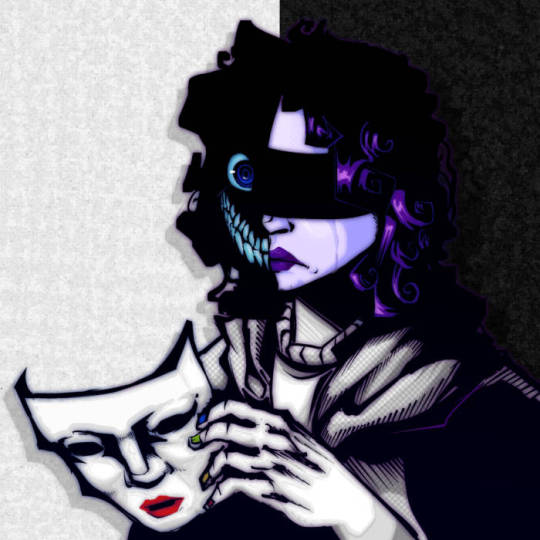

Propaganda for Chonny:
- From a musical album (Doubt any other characters will be from an album) - Said Album is really good. everyone should go listen to it - This one's a bit hard to characterized bc it's sort of three characters and sort of one. Just listen to the album and it still won't make sense but at least you'll have listened to one of my favorite albums - The album has a really compelling story about the division and unification of Heart, Soul, and Mind and idk if I've said this enough but it's a really good album ------------------------------------ -whole is going through a loop of events... Very often... Including the heart, mind and soul going through those with him.
-album... Very cool.
-yeah I can't make proper propaganda for him either
Propaganda for Homura:
you are 14 years old. after your first friends at your new school revealed they are Real Life Magical Girls, they die horribly against this super powerful monster witch. you make a wish to meet your best friend again so you can save her this time. every time you try to reach a golden ending where everyone lives goes horribly wrong so you resign yourself to letting your best friend's (and once your) friends die every time so you can save your best friend. you become colder, more efficient as the loops go on. you go through the same few months around a hundred times to try to save your best friend from her fate. this time you'll save her. she sacrifices herself for the every single magical girl and becomes a god and now you're the only one who remembers her. great! hooray! anyways a win for homura is a win for magical girls (and yuri). why relive a day or so when you can relive months am i right? ------------------------------------ "Poor girl relives the same 2 months 100 times just to prevent her doomed-by-the-narrative girlfriend from dying and becoming God ------------------------------------ - Was literally in the timeloop for 12 years - Did it all for yuri - Became like. the devil (also for yuri) - magical girl who's weapon is just normal ass guns and bombs and shit " ------------------------------------ When you go into a time loop to save your girlfriend from dying but she just keeps dying horribly in every universe so you slowly start to get sick of looping and start using more direct routes to try to save her to the point where she doesn’t even know you anymore as you’re just trying to save her but it gets to the point where you’ve looped so many times trying to save her that her soul has become so powerful that she can become god only then does she remember you. And she does to free you and all the other magical girls in history from their pain but because she did this she rewrote the rules of the universe and therefore became a non physical entity and you had to watch her rebuild the universe. No one else even remembers she existed except for her little brother who sees her more as an imaginary friend than anything else and the only thing you have to remember her by is the pink ribbon that she wore in her hair. Btw you and your friends still aren’t free from being magical girls but at least you can’t become horrible monsters who are but a shell of your former self when everything becomes to much so now the only risk is dying in combat horribly instead. ------------------------------------ There was a psp game once and I'm pretty sure the whole thing was just recurring nightmares of the timeloop. Like. This isn't canon. But it lines up to me. She went to catholic school once, also, like, she deserves a win. Not because of Christianity or whatever but in spite of it.
#timeloop#poll#Round 5#Chonny Jash#Chonny's Charming Chaos Compendium#Homura Akemi#Puella Magi Madoka Magica#madoka magica#pmmm
408 notes
·
View notes
Text
My Video Games Recommendations Masterpost
The same criteria as before -> has to have a female lead and little to no misogyny
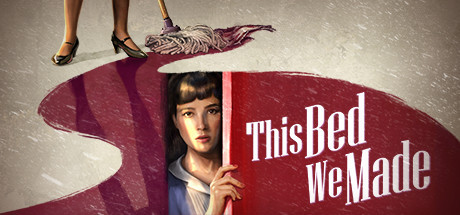
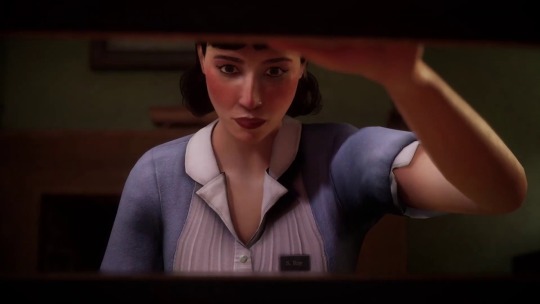
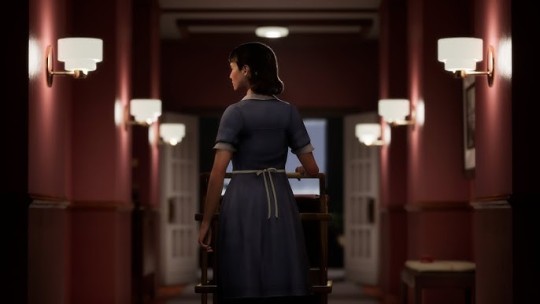
This Bed We Made Genre: Thriller, Puzzles, Narrative Game, Multiple Choices Story: A hotel housekeeper uncovers the secrets of some of her strange guests. Topics: Homophobia, Women's rights in the 50s, Mental Health, Classism Bonus: Lesbians!
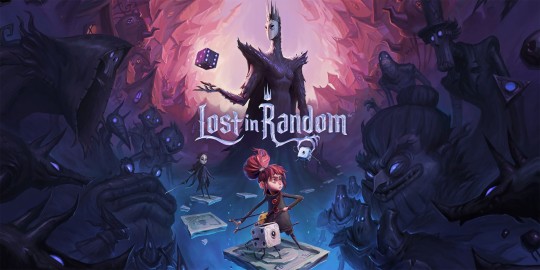
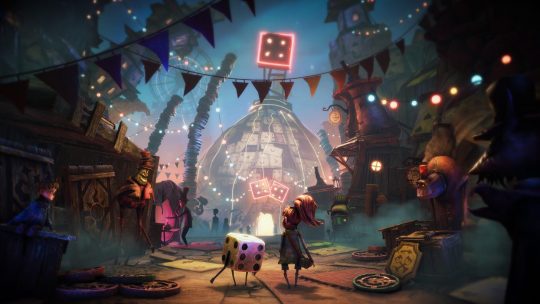
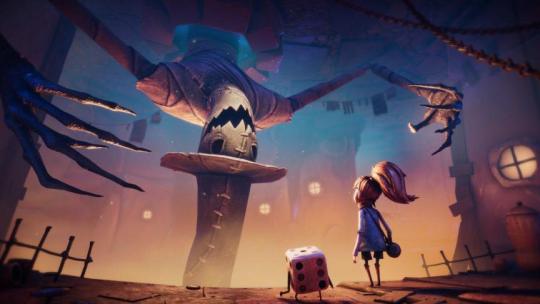
Lost In Random Genre: Whimsy, Adventure Story: In a magical world where the population is divided by social class decided on the roll of a dice, a girl embarks on a journey to reunite with her sister who was sent to live in the upper class. Topics: Sisterhood, Fairy Tales, Classism, Humour Bonus: It's like playing a Tim Burton movie
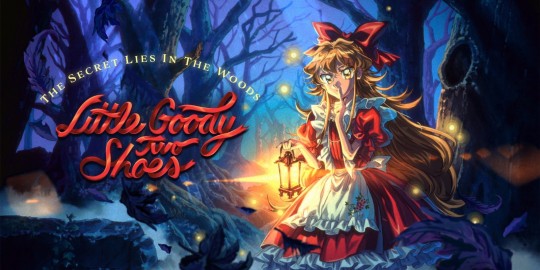
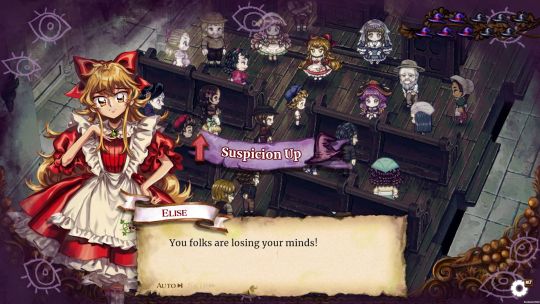
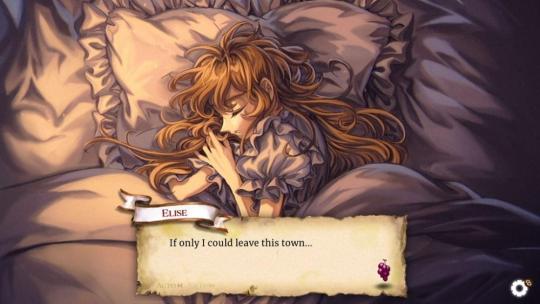
Little Goody Two Shoes Genre: Horror, Romance, Narrative Game, Multiple Choices Story: To get out of poverty, Elise makes a deal with the devil (literally) Topics: Religion, Witch Hunting, Fairy Tales, European Folklore, Paganism Bonus: The main character is a lesbian. Sometimes, the characters break into songs like a musical.
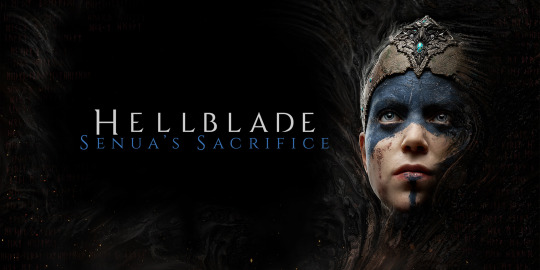

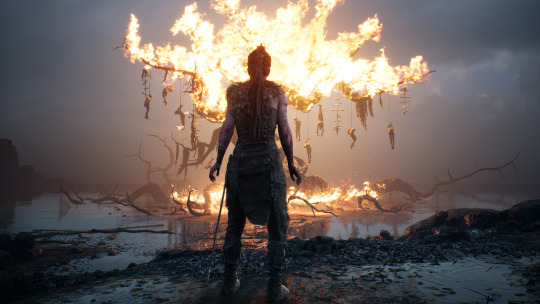
Hellblade: Senua's Sacrifice Genre: Psychological Horror Story: Senua, a young Nordic woman who suffers from schizophrenia, is seeking an audience with the Goddess Hela. Topics: Schizophrenia, Anxiety, Paranoia, Celtic Mythology, Witch Hunting, Marginalisation, Grief Bonus: Best acting you'll ever find in a game

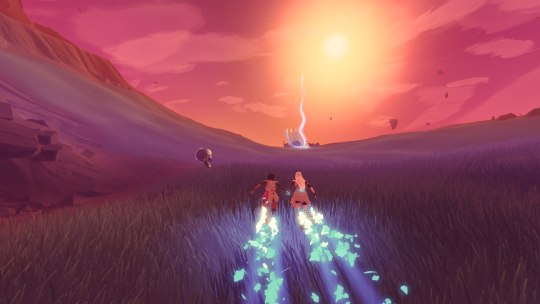
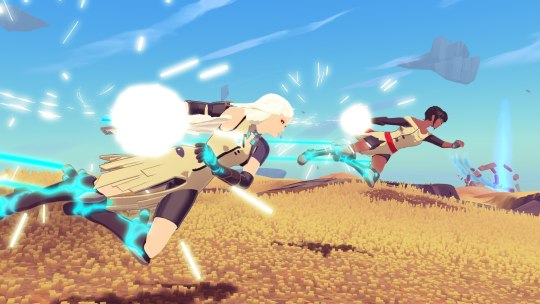
Haven Genre: Exploration, Resource Collecting, Romance Story: Yu and Kay are on the run and have taken refuge on a supposed deserted planet so they can be together. Topics: Forbidden love, Science, Intimacy, Humour Bonus: Can be played as a lesbian, straight or gay couple (the lesbian couple has the best voice acting)
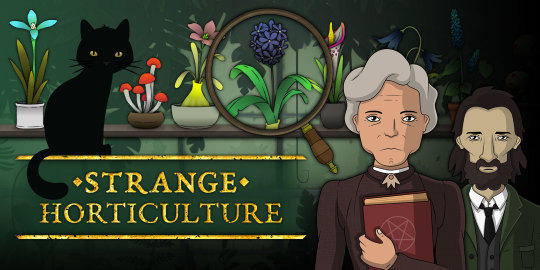
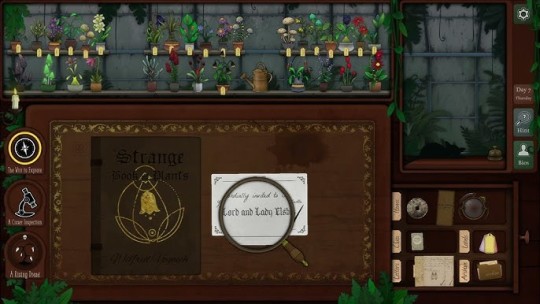
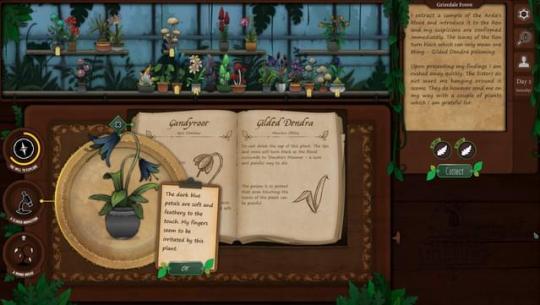
Strange Horticulture Genre: Thriller, Puzzles Story: As the owner of a flower shop, you must find the right magical plants for your customers and discover who is the murderer (yes, there's also a murderer) Topics: Witchcraft, Cults, Mystery Bonus: You can pet the cat. It's point and click so you can play it on your laptop while chilling in bed (that's what I did, it's super cosy)
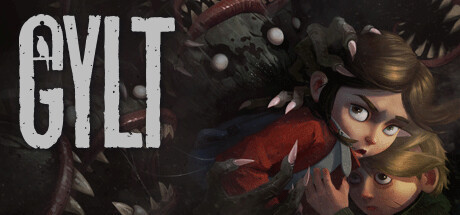
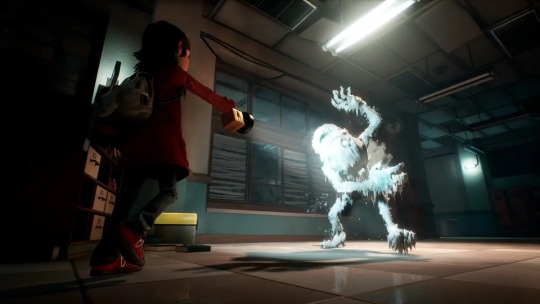
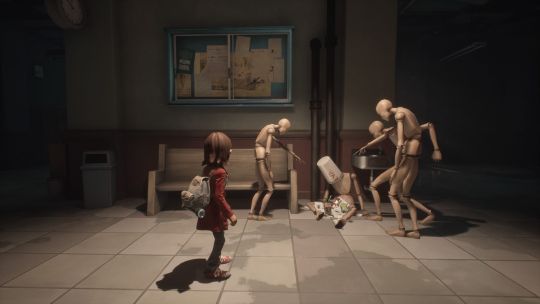
Gylt Genre: Adventure, Light Horror Story: A little girl is looking for her cousin who disappeared after being bullied and she discovers a dimension filled with monsters. Topics: Bullying Bonus: Makes you feel like you're in an animated movie
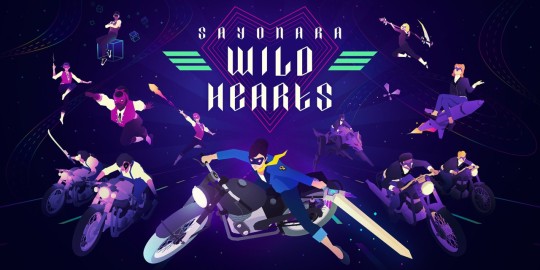
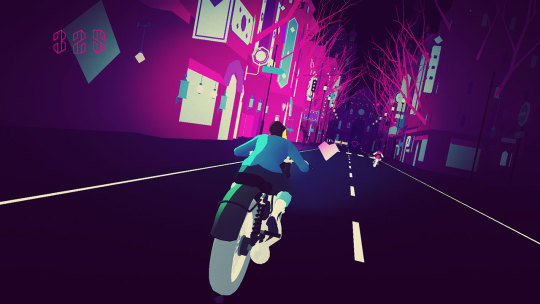

Sayonara Wild Heart Genre: Fast paced rhythmic action Story: A broken hearted woman faces the women in her life in a colourful and retro looking world Topics: Music, Mental Health, Romance, Self Discovery, Psychedelic Bonus: Gorgeous soundtrack
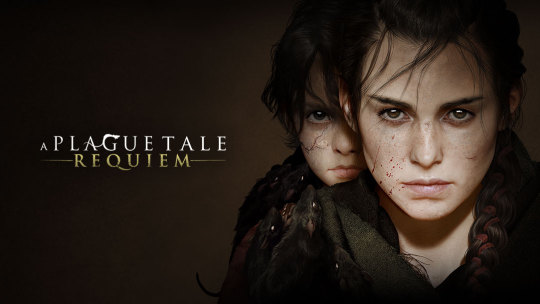
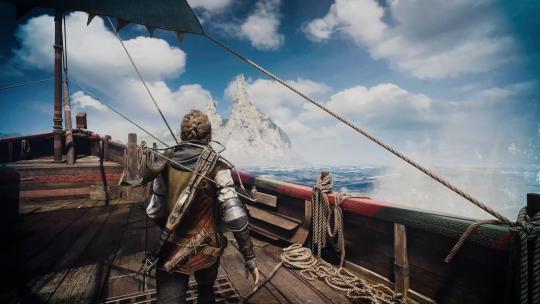

A Plague Tale Innocence & A Plague Tale Requiem Genre: Drama, Adventure Story: A girl must survive and protect her little brother while being hunted down by the inquisition, a cult and facing a plague of rats. Topics: Trauma, Childhood, Alchemy, Medieval, France, Death, Sacrifice Bonus: Excellent voice acting in french!
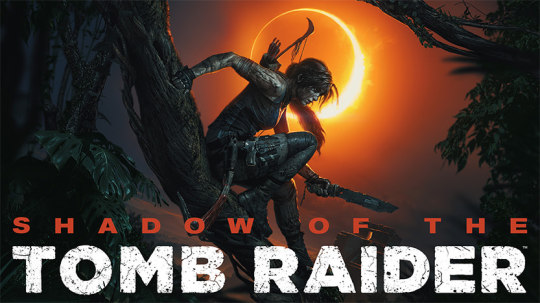
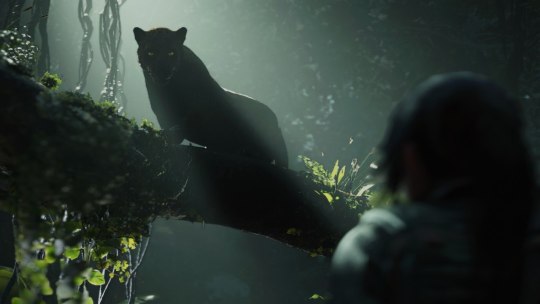

Shadow of The Tomb Raider Genre: Action, Adventure, Puzzles Story: Lara Croft explores Peruvian mythology in search of a magical artefact. Topics: Mythology, Remorse, Friendship Bonus: The Amazon forest! You can pick your outfits. And you can kill lots of men.
469 notes
·
View notes
Text
Why The Genderswap Is The Best Thing About Warriors
Here's another post on The Warriors genderswap because I’m still not over how good it was!!!
You've got to understand that changing the Warriors to women was a sacrifice. No matter how good a choice it was, it alienated a lot of the people who would otherwise be obsessed with it.
Warriors is already a cult 70s movie - it doesn't have a huge fanbase. Making the main characters women basically alienated that entire fanbase. Because Warriors is very much a movie about masculinity.
The fans liked it because it was about masculinity, and masculine themes (courage, honour) done masculine-y.
You can find megafans of the movie on reddit or tumblr, who are very much annoyed that the story is no longer about men being men. The story isn't the same anymore, and they aren't interested.
But the change wasn't made without reason.
Lin Manuel Miranda previously thought it was impossible to turn the Warriors into a musical, despite it being one of his favourite movies. The thing that changed his mind? The genderswap.
The Warriors album was made because of the genderswap. Lin thought it was the only interesting way to tell the story in the modern age - and you know what? He was right.
Everything just hits harder when they're women.
Orphan Town and We Got You are hilarious because they're women.
Turning a male/female seductions on their head. Male seduction is a k-pop Ballad about being a nice guy? Genius.
Moments like Call Me Mercy and Park At Night are empowering and emotionally charged because they're women.
Mercy looks at the Warriors and for the first time in her life sees women that have empowered themselves, and drops everything in her life to join them, because she wants to feel like that too.
Ajax sees a catcaller sexually harassing all of her friends and thinks "I need to teach this guy a lesson, because no one else in the world will ever do that"
The story feels more intense - it feels scarier.
On some level, every women is afraid to walk home at night, and Warriors is just that feeling elevated to a musical. The threat doesn't just feel more real - it feels intimately relatable.
The genderswap was heavily inspired by gamergate. Warriors is now a story about women not being believed, being falsely accused and taken advantage of.
But the story's moral still ends up being that these women need to keep their pride, need to keep pushing on. Through everything they still hold their heads high.
God it just works so well.
Re-intepreting Luther into an incel-type villian who wants the women out of his "space"? Brilliant. Turning the controversial Swan/Mercy romance into a lesbian love story? Fantastic! Shifting the story from being about courage, to being about the courage to hold your head high even after being attacked with gender-charged abuse? Life-changing.
The emotions just... work better when they're women. Reversing the genderswap now would be taking the story's teeth away.
You can't reverse time now guys!
Much like Warriors evolved the book - the musical evolved the movie. The dudebros are scratching their heads - angry they can't relate to the musical, without realising that they aren't supposed to.
Warriors is no longer a story about masculinity. It's about femininity now and I couldn't be happier.
#warriors musical#warriors album#lin manuel miranda#swann#mercy#swercy#meta#the warriors#musicals#musical theatre
528 notes
·
View notes
Note
only homophobes prefer fiyeraba to gelphie
ok that's not even true
Fine, you want to know what I love so much about Fiyeraba? I'll tell you.
Knowing Elphaba changes both Fiyero and Galinda. They're never the same again. Fiyero embraces that. He doesn't want to go back to not caring because he loves caring about her no matter how frustrating and difficult and painful it is. He's willing to run away for her through the entirety of act 2 and does it as soon as he's given the chance.
Glinda changes too, but she hangs onto her old dreams. She's so sure she can make herself happy with the things she used to want, even if she isn't happy she'll get there, she couldn't be happier, even if it isn't true YET it WILL BE because she will MAKE IT SO...
That's the difference. Both of them are never the same again for having known Elphaba, and both of them love her, but Fiyero is the one who makes the sacrifice. He's the one who embraces it. Glinda wants to, deep down, and her tragedy is as much her own fault as any other events of the musical.
She and Elphaba sing For Good, of course. Glinda acknowledges the change in the end and is a better person for it. But not before she loses everything and everyone that really matters to her. That's her tragedy and I could scream and cry about it all day.
Fiyero runs off with her. Maybe it's a rash choice, but it's the one he knows he has to make. He can't do the whole "life is painless for the brainless" thing anymore so he embraces the pain because even if love hurts, he's willing to let it hurt if it means experiencing all the joy that comes with love.
That's why fiyeraba > gelphie for me. And don't get me wrong, I ADORE Glinda. She's probably my favorite character, because I relate to her in a lot of ways (me too, Glinda. I would cause my own tragedy in that situation too) and her story is aafgjsdfkgjsdfhgkjshkjfgsf i could lose my mind over it. But as a ship? Fiyeraba. That's where the romance is at. He's the one who deserves her, not because he's a better person than Glinda, but because he's willing to act on having become a better person, while Glinda clings to the threads of a dream that will never be fulfilled, because she'll never be the person she was when she dreamed it up.
#wicked#wicked musical#wicked the musical#wicked movie#wicked the movie#wicked 2024#fiyeraba#gelphie#fiyero tigelaar#elphaba thropp#galinda upland#glinda the good
393 notes
·
View notes
Text
I love every iteration of the trio relationships of Wicked they’re all so insane in their own unique way.
Like you have the all-but-canon Galinda/Elphaba, which is basically the plot of the musical. Two girls whose fates are intertwined, but whose faults are not in their stars but themselves. Elphaba always walking forward and Glinda always trying desperately, fearfully to keep up. Two very different people who cannot change who they are and the roles that their world leads them to take because of their perspectives…but who also see the best in each other that even the audience sometimes doesn’t see. Ever-trusting, ever-loving, a stronger bond than all the powers of the world. And Glinda, who is so very afraid of losing, desperately begs in the end to die for Elphaba - to sacrifice herself for once - and Elphaba demands that she LIVE instead. Recognizing that she can do everything Elphaba couldn’t, because they are BOTH FLAWED CHARACTERS IN COMPLEMENTARY WAYS AHHHHH-
And then you have the canon Elphaba/Fiyero, which on the surface/in Act 1 seems like a pretty standard-issue romance plot. But then Act 2 hits and you realize that no….Fiyero is just as absolutely wild as Elphaba is and is the only one really matching her energy. He dedicates his life to finding her and helping her cause. He actively criticizes the wizard and Morrible when even Glinda dares not. He runs away with Elphaba and she allows him to come knowing that it’ll probably kill them both. He straight up dies to save both of the girls, because he sees their lives and powers as more important than his own. Then his death precipitates the rest of the story, because it’s the one love she ever had that wasn’t conditioned. Wasn’t limited. And Elphaba saw through him from the start: She watched as he jumped to rescue the Lion cub when even she didn’t know what to do. And she goes back for him in Act 2, trusting him to come. “It wasn’t like that.” “But it was.” BUT IT ALWAYS WAS
And then you have Glinda and Fiyero, which I have already written entire ESSAYS on here about. Two people who are too perfect together - who know each other TOO well. They love each other very much: Fiyero pleads with Glinda to run away with him, tells Elphaba that they’ll find Glinda again and make up with her, and his last words are him begging for her forgiveness. And she’s using all of her political power to protect him, to save him from himself. But he’s too much like Elphaba, and he criticizes Glinda, telling her what she already knows about herself: she’s a power-hungry sycophant. They still love each other anyways. The problem is the giant gaping hole in the middle of their relationship where a young green woman used to be.
AND THEN
AND T H E N
YOU HAVE THE ABSOLUTE DEVASTATION THAT IS THE TRIO TOGETHER.
Fiyero’s borderline irrational obsession with Elphaba! Elphaba’s borderline irrational obsession with Glinda! Glinda trying desperately to be more like Fiyero - somebody brave enough to take the leap!
The hole in any pairing within the trio where a third core component of their relationship/friendship used to be! The bittersweet tragedy of a thing that can never be! The way they all complete each other but can never be together because who they are and the world they’re in won’t allow it!!
Elphaba’s overwhelming compassion that destroys her life! Fiyero’s plans and genre-savviness that lets him save them at his own peril! Glinda’s courage in the end to be Glinda the Good! The heart, the brains, and the nerve!!!
“I miss her too, Fiyero” / “Someday, you and Glinda will make up. and we’ll all-“ / “He loves her…” “Glinda, I’m so sorry” GOD.
Idk what they put into these three characters but I am THERE FOR IT BABY.
#gelphie#fiyeraba#thropple#wicked#gliyeraba#This is too rambly and doesn’t even say HALF of what I want it too#just AHHHHHHHHHGGGGG HOW CAN YOU NOT LOVE ALL THREE OF THEM#THEY’RE ALL SO DIFFERENT BUT COMPLEMENTARY
212 notes
·
View notes
Text
Writing advice #?: When it comes to characterization, obligation > love.
What I mean by this: love is basically universal. It offers little variability. Almost everyone has a friend, sibling, etc for whom they'd do anything. Allegedly even Hitler loved his apocryphal dog, John Wilkes Booth was a good brother, yadda yadda so forth.
So if you want to have a story that makes us like your character Liv, and establishes interesting tension that will draw out who Liv is as a person... don't write about her rescuing her beloved mother. Write about what happens when someone she dislikes is in danger.
Two great examples I've read recently:
In The Drift by C.J. Tudor, Meg is trapped in a broken-down cable car with five other people and no way to call for help. She risks her life, performing a heroic physical feat that causes herself serious injury - to save a woman who accused her of murder, suggested leaving her to die, and generally treated her like dirt all week. Meg is heroic as hell.
In Dungeon Crawler Carl, the eponymous Carl ends up in the adventure because he ran outside in boxers in -10°F weather to save his ex-girlfriend's obnoxious, misanthropic cat. Carl might be a shlub, but he's a rock solid dude.
I could go on - would Shiloh saving Jeb be nearly as powerful if Jeb wasn't such an asshole? - but the point remains. Meg sacrificing so much to save her partner would be just what's expected. Carl rescuing a cat he chose to adopt is a non-event. Obligation is where the rubber hits the road. Where the ordinary people get sorted from the awesome ones. Where the character-defining moments occur. Over 99.9% of humans ever researched would sacrifice a stranger to save a loved one; a rare form of brain damage that causes people to value strangers and family the same is considered extremely aberrant.
I mention all of this because fan fiction is chock full of examples of characters dying (or killing, or walking through fire, or...) to save their best friends and their sisters and their fiancés. And if you want to write a story about Dean Winchester killing orphans or going to hell or destroying his car to save Sam Winchester, awesome. But there's not a ton of room for characterization in there.
If you want us to learn something about who this person Liv really is, show her forced to choose between rescuing a dog who just bit her and making it to a job interview on time. Let her see her loud neighbor with the bass-boosted music about to get a ticket for an expired meter. Give her a choice between saving 10 strangers or saving her wife. Have her walk by her sexist coworker and realize the guy is quietly sobbing. Literally anything she does next will be interesting, and say a lot about her as a person. If she's just choosing between her wife's life and her own, or her wife's life and the sexist coworker, then the scene might be poignant or sad - but it won't be surprising or tense or revelatory about Liv as a person. The big moments of heroism aren't driven by love, but by obligation.
284 notes
·
View notes
Text

In and of itself, Nowhere is the prophecy that Ivan has written for himself, one of self destruction. Fitting for one of the most tragic characters in this show, the one whose love was requited but who never let it be anything due to his own stubbornness and blindness. Not only that but the way that he thinks of himself, as a monster who only serves to hurt those who he loves, is something that proves not to be true, necessarily, but it proves to be true through Ivan's twisted worldview as he hurt Sua by making fun of her sacrifice and he hurt Till by kissing him at the worst possible time. This song, Ivan's first solo since Black Sorrow, echoes that in being another self-fulfilling prophecy of Ivan's, another lie that he told himself so many times that he made it come true.
The repetition of musical elements such as the lifting scale of chimes, the swing of the instrumentals, the snare and percussion being pretty much the same every time only adding to the sensation of mounting foreboding up and up, a rising action that continues to rise but never truly reaches a climax, no culmination, no conclusion until death. My friend Zen (@verdantlights) called it eerie, and I agree. The way that the song all comes together, it feels like a tragedy unfolding in front of you, over and over, one that you know will happen and yet you can do nothing to prevent. It's almost like the "tainted history" that Ivan talks of, the repetition of events again and again over time, the way that history seems to be cyclical and we, as humans, never seem to truly learn.
In certain ways, the song is about the way that the perceived reality of the world and the world's actual reality are very, very different things. Considering the line about "a stiff dream dyed in rose-colored hues" that slowly changed to a dream dyed purple, to a dream dyed black, it is the way that when we are children we are able to hope for a better future than the one we think will actually come and how as we age, we are traumatized by the world to the point where we can no longer hope for anything better. Becoming someone who dismisses hope because you've tried hoping before and you only ended up with a kick in the gut and a punch in the face, well, that's a trauma response. We are all slowly traumatized over time into believing that the world can't get better, our rose-colored dreams becoming purple until they finally fade to black, blotted out by the corruption of memory, those times when we dared to dream and we were shot down from out of the sky, our wax wings not even given the chance to melt. We are beaten down by life, over and over again, until we are simply forced to go through the routine that society demands of us and say that we are content (wake up, wake up to the usual routine & wake up, wake up to this beautiful life, is it for real?).
The worst part is that Ivan knows better (a dustlike existence can't open its eyes to look. I close my eyes). The whole reason why Ivan admires Till so much in the first place is his willingness to fight, his hope for a future without slavery for humans, his unadulterated and true love. Ivan knows what hope feels like and he knows that he just can muster it anymore, too exhausted to be anything other than apathetic (the wounds that kept reopening just became numb), but he can still love Till's vivacity and drive for change. Ivan views himself as something dirty, something broken that only serves to break others. He thinks that he's a monster who can only do the people he loves harm, and to a degree, that's true, his belief a self-fulfilling prophecy.
Ultimately though, Ivan is an immensely unreliable narrator, someone so biased against himself and towards literally anyone else but someone who is so stubborn that he is unwilling to believe anyone else's opinions on him because they have never met his "true self" only the mask that he wears that he ends up digging a deeper and deeper hole. He thinks of his story as one that's already written, the repetition of the line "this always happens to me" echoing that, especially with the way that eventually that song ends with it repeated again, "yeah, it's always like that, this always happens to me." Ivan isn't trying to fight it because his dream has long since been stained black, despite the fact that he knows that he could break out of this cycle of despair. He knows this prophecy that he is submitting to is one that he wrote himself and yet, where he stands right now? He has no will to change it.
note: My friend Ish (@chevalperd) screenshotted @/ivantill7089 (on twitter)'s english translation of this song for me, which is what I am referencing for the lyrics! I love you Ish thank you again so much :3
#yeah i think. i think that's good for right now. (inhales deeply) okay you can do this rock. as vant said. you're cooking. you're cooking#alnst ivan#alien stage#alnst#ivantill#till is mentioned but he's not like. the subject of this? i'll tag him anyways i guess#alnst till#alnst sua#rocktalks#rockwrites
191 notes
·
View notes
Text
Analyses of Most Ghost Characters be like…
Terzo was a tragic and extremely deep figure who, based off observations provided by his ghouls and Bishop Necropolitis, was a brilliant mind whose ideas were bastardized and squandered, which resulted in a disappointed and bitter husk of a man who still made an effort to display kindness. However, we will likely never truly know the full story of who he was because he lied so damn often.
Most of how we perceive Secondo is arguably the result of Sister badmouthing him as well as ghouls being brutally candid about how he acted in interviews. However, there’s reason to believe Secondo might’ve been just as multifaceted as Terzo, in that he wasn’t being his complete self to the audience. There’s evidence that could suggest Secondo did not enjoy being Papa in its entirety so much as the perks, which were ironically also hindered by him being Papa at the end of the day. It’s not hard to interpret him as someone who might not have enjoyed being a part of the bloodline at the end of the day because of what it meant he had to sacrifice.
Copia is a manchild, likely as a result of how he grew up: Orphaned, likely a social outcast, very likely undiagnosed. As a result, he might’ve become convinced that the only way to rise above it was to become someone worthy of adoration: Papa. But even after he ascended, his troubles didn’t stop: He had to learn his parentage, didn’t address the fact that his brothers were now dead, and spent the last few months he had with the woman he now knew was his mother dissociating because he developed a fear of death. This fear, mind you, that easily ties back into the theorized likelihood that he placed his self-worth into his success. And this is before getting into his willingness to be a puppet —
Papa Nihil’s complexities come in the form of his tendencies to escape reality and the consequences these brought. He was very likely an absent father, which would have had effects on his sons (say, attention-seeking tendencies; a distrust in authority; abandonment issues). In fact, the only things he seems to seek from his youth is his extremely short-lived music career and his unstable relationship with a woman who ultimately kept quiet about their son(s) they conceived together and ultimately played his lust and delusions against him to play nepotism. And by leaning into this, he got his own children killed. He only “became a father” after he died, and it’s sad that he actually seems his most lucid then. What’s all the more mind-boggling and makes you wonder about his tenure is his ability to be in the moment and try and convince Cardi to learn to do the same. It makes you curious: Was Nihil actually a good Papa when he wasn’t distracted?
Sister Imperator is willfully emotionally constipated and will justify it as being “for the good of the church”. She has definitely been affected by her decisions and what she’s done, from her relationship with Nihil to her giving up her babies and watching them at a distance, only interacting from a work standpoint. She lies, keeps secrets, has people killed off, all to tie her spawn into the position as Papa, which is curious considering her position means she’s already above the station of Papa. She does care about Cardi, but she doesn’t care for him the way he needs to be and, as a result, arguably only exacerbates his anxious tendencies. She’s an extremely interesting character but it’s so easy to water her down to just being manipulative and evil.
………………
Analyses of Primo —
Primo is fucking crazy man I don’t — Like, he might be a serial killer; he would punch a panda for profit; we aren’t even entirely certain he’s human like I would legit headcanon that Primo is a changeling and the fandom would run with it because what choice do we have, he honestly actually could be!!!
#the band ghost#papa emeritus i#papa emeritus ii#papa emeritus iii#papa emeritus iv#papa Nihil#sister imperator#jk about Primo I actually have Thoughts about him#but at the same time —#real talk tho it’s hilarious that TF probably didn’t even intend to make them all as deep as they wound up being#it’s almost like pareidolia#but for personalities and traumas that shaped them
254 notes
·
View notes
Text
i need to get this off my chest. this is a personal vent post so please don't jump down my throat, but a thing that makes me feel some kind of ways is just how much bg3 is being viewed now through rose-tinted glasses in order to dunk on veilguard. i've seen this happening on most platforms tbh.
and sometimes i remember for a brief moment what larian did before the release (much of this in the last few weeks before release no less) and after the release of the game:
-lied abt the your race having consequences throughout the story (saying that drow being feared in act 1 and persecuted in act 3 and it then... just not happening at all. drow walking around on the surface is just fine now ig. again it still boggles my mind how drow are allowed to roam around in baldur's gate without consequences considering that they are known to be responsible for kidnapping duke ravengard but i won't get on that soapbox again.)
-lied abt the upper city being available in act 3
-lied abt romance progression & how romances would play out in general prior to release (pfh + release trailers and promo)
-game-breaking bugs
-romance-breaking bugs for months (gale and wyll)
-one companion who has a third to half more content than any of the other companions and who was heavily favoured and focused on during development to the detriment of others (with the narrative design lead even admitting to this)
-was missing an actual ending that they only added months after release
-was missing the evil path that they actually promised prior to release
-offers quite little in the way consequences even now (not giving karlach upgrades for example has zero bearing on her and she still survives to make her sacrifice on the pier, ethel coming back no matter what you did, downgrading gale's need for actual artefacts of power bc ppl can't part with their loot even for narrative reasons, etc.)
-lore-breaks + poor research on established lore (the whole timeline with mystra, minthara using an eilistraeen endearment, etc)
-massacring returning characters like viconia and sarevok
-constantly changing dialogue around / scrapping old ones / adding new ones depending on fan demand
i could go on, but it's... a lot already.
i obviously love the game despite its many flaws and it's done some other things wonderfully - just like veilguard. the unique body language of the companions, the animation and creativity, the voice acting, the music, act 1 overall and parts of act 2, etc. it's one of my most played games and one of my most beloveds (mostly bc of gale, my ocs and friends' oc).
all these game have flaws. the one difference i see is that bg3 has been given the benefit of the doubt and overall an abundance of good will (generally speaking) and veilguard hasn't been.
294 notes
·
View notes